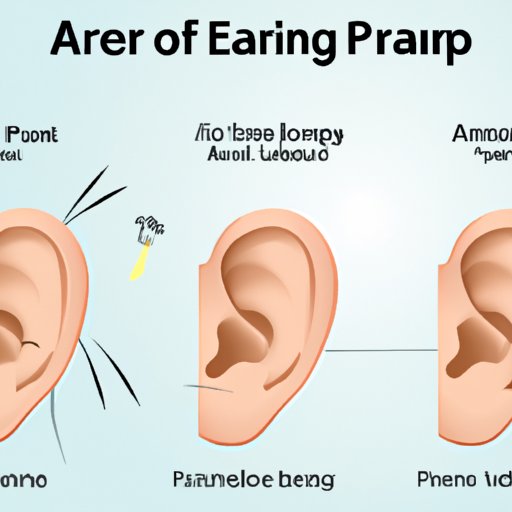I. Introduction
We’ve all experienced the sensation of our ears popping, whether during a flight, while driving up a mountain, or even just swallowing. But have you ever wondered why this happens? In this article, we will explore the science behind ear popping as well as practical tips for managing and preventing it.
II. Explore the Anatomy of the Ear and How it Functions
To understand ear popping, we must first familiarize ourselves with the anatomy of the ear. The ear is divided into three parts: the outer ear, the middle ear, and the inner ear. The middle ear contains three small bones, the malleus, incus, and stapes, which transmit sound waves from the eardrum to the inner ear. The inner ear is responsible for balance and contains the cochlea and semicircular canals.
Changes in air pressure can cause the eardrum to move back and forth, which can be uncomfortable and cause the sensation of popping. The pressure inside the middle ear must be equalized with the pressure outside the ear in order to prevent this sensation.
III. The Science Behind Ears Popping
The physics of air pressure changes is what causes ears to pop. Changes in air pressure can occur during takeoff and landing in airplanes, or when driving up hills or through tunnels. The body has a natural way of regulating pressure changes in the middle ear, called the eustachian tube, which connects the middle ear to the throat. The eustachian tube opens and closes to balance the pressure between the middle ear and the outside environment.
However, some people are more prone to ear popping than others. For example, people with allergies or sinus problems may experience more frequent ear popping due to inflammation in the nasal passages and eustachian tube. Additionally, scuba divers are at risk for ear injuries due to the pressure changes they experience underwater.
IV. Coping with Ear Popping
If you experience ear popping during flights, try sucking on a hard candy or chewing gum to help equalize the pressure. Yawning and swallowing can also help. For scuba diving, equalizing the pressure frequently during the descent can help prevent ear injuries.
Repeated ear popping can lead to discomfort or even hearing loss. If you experience severe or frequent ear popping, it’s important to see a doctor to rule out any underlying conditions.
V. Common Causes of Ear Popping
Several factors can cause ear popping, such as changes in altitude, allergies, or ear infections. When flying, the pressure in the cabin decreases as the plane ascends, leading to ear popping. During allergy season, inflammation in the eustachian tube can lead to swelling, which can cause difficulty equalizing pressure in the middle ear.
To minimize ear popping, avoid triggers such as high altitudes or allergens.

VI. Researching Effective Treatments for Ear Popping
There are several treatment options available for ear popping, including over-the-counter medications, home remedies, and professional treatments. Decongestants can help reduce swelling in the eustachian tube, while allergy medication can help manage allergies. Home remedies such as swallowing or blowing up balloons can also help equalize pressure.
In severe cases, a doctor may need to insert a small tube into the eardrum to help equalize pressure. However, this is usually a last resort and is not often necessary.
VII. The Psychology of Ear Popping
For some people, ear popping can be a scary or uncomfortable experience. This may be due to a fear of pain or an underlying anxiety disorder. Addressing the psychological reasons behind ear popping-related anxiety can help alleviate discomfort and prevent the exacerbation of physical symptoms.
VIII. The Cultural Significance of Ear Popping
Ear popping has been a cultural phenomenon for centuries. In some cultures, such as Chinese medicine, ear popping is believed to be a sign of excess wind in the body. Remedies such as acupuncture or acupressure aim to regulate the flow of energy in the body to alleviate ear popping.
IX. Conclusion
Ears popping can be an uncomfortable and even painful experience, but understanding the science behind it can help us manage and prevent it. By familiarizing ourselves with the anatomy of the ear and the physics of air pressure changes, we can take steps to ensure our ear health. Additionally, seeking help from medical professionals or addressing any underlying psychological issues can prevent ear popping-related discomfort.
